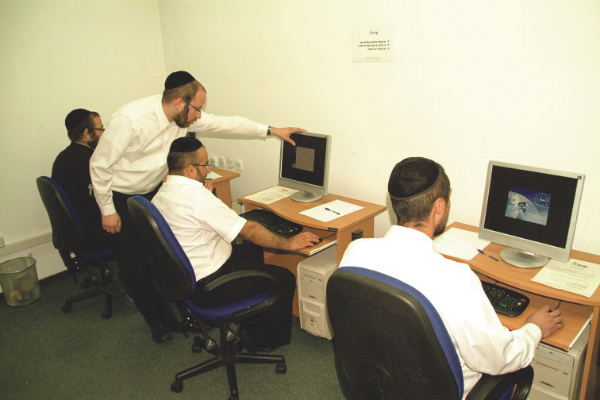Special Report: Peyot with a pay packet
We look at an organisation helping Charedim in Israel pursue a career while preserving their culture
Slowly, almost by stealth, the strictly- Orthodox world is changing. Nowhere is that more apparent than in Israel and the vexed question of getting Charedi men into the workplace, something that was previously unthinkable, but is now, gradually, becoming more acceptable.
One man who should know is Rabbi Nechemia Steinberger, a cheerful Jerusalemite who, 10 years ago, aged 25, changed his life. In London to meet supporters of Kemach, the organisation that promotes Charedi employment, Rabbi Steinberger, Kemach’s director of strategic partnerships and development, spoke of the unwritten contract in the yeshiva world that work is not discussed, that men devote themselves to Torah study, and that their wives, where possible, are the breadwinners.
The result of such an approach is that thousands of Charedi families live in poverty and on benefits. Kemach (Hebrew for flour, from the rabbinic teaching ‘if there is no kemach, there is no Torah; if there is no Torah, there is no kemach’)seeks to change that by helping men to enter the workforce, through training and educational programmes.
Get The Jewish News Daily Edition by email and never miss our top stories Free Sign Up
When Rabbi Steinberger first approached Kemach he was better qualified than most yeshiva students — because he grew up in an English-speaking environment. So he had one of the four “building blocks” Kemach deems necessary for success in finding a job: a basic understanding of maths, good English and Hebrew, and a facility with computers. With these basics, Kemach has placed 20,000 Charedim into the Israeli job market in the past 10 years.
“The main goal of the Charedi community is to preserve and keep their values,” says Rabbi Steinberger. “And that means that Kemach does everything possible to meet that aim, providing the men who approach it with support and assurances that they will be able to enter the job market on their own terms — that is, without compromising the Charedi way of life.
“What works for Kemach is what works for the Charedim. We have one aim, to get as many strictly Orthodox into work as possible. So we provide viable options: and we tell them, you can be a plumber or an electrician, or you can be a rocket scientist. It’s up to them. But we don’t try to change them: and we ensure, right from the start, to get approval from the rabbis”.

There are said to be around 1.2million Charedim in Israel, with an average of seven children per household. Kemach estimates that more than half of the children are growing up beneath the poverty threshold.
Increasingly, the men are concluding that they cannot provide for their families by living on benefits. And the incentive cuts both ways, says Rabbi Steinberger. “Official statistics say that for every Charedi who goes out to work, the state saves 240,000 shekels (£51,600) per person, per year.” This is because once the man is off benefits and paying taxes, he is making an improved contribution to society.
In the years since its founding in 2007 — spearheaded by British philanthropist Leo Noe and supported in Israel by UJIA — Kemach has encouraged hundreds of men, and, latterly, women, to enter the workplace. There have been some singular successes including a Charedi airline pilot, a chef, law graduates and medical students. One of the best known is Yehuda Sabiner, who has just completed his training at the Technion medical school. There is even a Charedi man who runs a horse farm, to provide riding for the disabled courses.


Thank you for helping to make Jewish News the leading source of news and opinion for the UK Jewish community. Today we're asking for your invaluable help to continue putting our community first in everything we do.
For as little as £5 a month you can help sustain the vital work we do in celebrating and standing up for Jewish life in Britain.
Jewish News holds our community together and keeps us connected. Like a synagogue, it’s where people turn to feel part of something bigger. It also proudly shows the rest of Britain the vibrancy and rich culture of modern Jewish life.
You can make a quick and easy one-off or monthly contribution of £5, £10, £20 or any other sum you’re comfortable with.
100% of your donation will help us continue celebrating our community, in all its dynamic diversity...
Engaging
Being a community platform means so much more than producing a newspaper and website. One of our proudest roles is media partnering with our invaluable charities to amplify the outstanding work they do to help us all.
Celebrating
There’s no shortage of oys in the world but Jewish News takes every opportunity to celebrate the joys too, through projects like Night of Heroes, 40 Under 40 and other compelling countdowns that make the community kvell with pride.
Pioneering
In the first collaboration between media outlets from different faiths, Jewish News worked with British Muslim TV and Church Times to produce a list of young activists leading the way on interfaith understanding.
Campaigning
Royal Mail issued a stamp honouring Holocaust hero Sir Nicholas Winton after a Jewish News campaign attracted more than 100,000 backers. Jewish Newsalso produces special editions of the paper highlighting pressing issues including mental health and Holocaust remembrance.
Easy access
In an age when news is readily accessible, Jewish News provides high-quality content free online and offline, removing any financial barriers to connecting people.
Voice of our community to wider society
The Jewish News team regularly appears on TV, radio and on the pages of the national press to comment on stories about the Jewish community. Easy access to the paper on the streets of London also means Jewish News provides an invaluable window into the community for the country at large.
We hope you agree all this is worth preserving.
-
By Brigit Grant
-
By Laurent Vaughan - Senior Associate (Bishop & Sewell Solicitors)
-
By Laurent Vaughan - Senior Associate (Bishop & Sewell Solicitors)
-
By Laurent Vaughan - Senior Associate (Bishop & Sewell Solicitors)
-
By Laurent Vaughan - Senior Associate (Bishop & Sewell Solicitors)






















